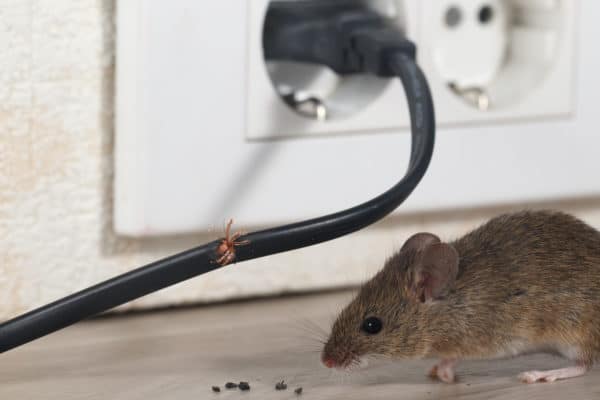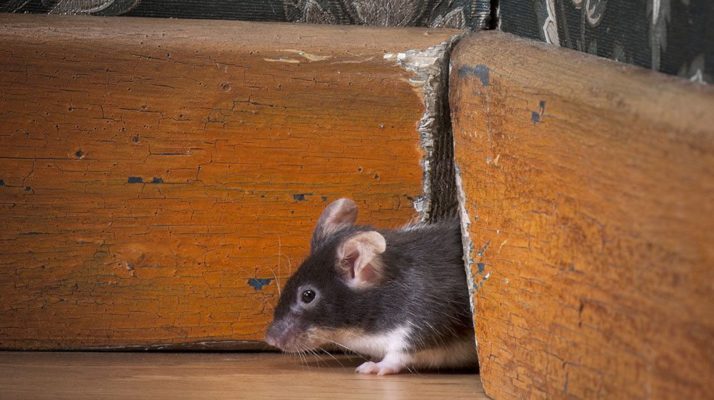Autumn’s Unwelcome Guests
When fall days get shorter and colder, raccoons, mice, and squirrels know that it’s time to start preparing food and shelter for the winter months. They do not hibernate in winter, and the warmth and security of your walls and attic make your home the perfect winter den. While ideal for them, for you it means damage to your home and health risks for your family.
In our three-part blog series Autumn’s Unwelcome Guests, we’ll look at how raccoons, mice, and squirrels get into your home, the damage they cause, and the health risks they pose. And of course, how Modern Pest can help you get these critters out of your house and back to nature.

Part 2: Mice
Mice came to North America on the colonists’ ships and are now found in every state. And this time of year, they’re often in your New England home. Have you heard scurrying and squeaking in the walls? Seen small, brown pellets in your kitchen drawers? You probably have mice.
Think you might have mice taking shelter in your home? Contact Modern Pest today before your mouse problem gets out of control!
Fattening up for Winter
Mice will eat almost anything. Their diet typically consists of cereal grains and seeds, but they will readily try new foods. They will choose foods high in protein, fat, and sugar if they’re present, and enjoy bacon, chocolate, and butter. House mice don’t need to consume much water and get most of their hydration from the foods they eat. However, they will drink water when it’s available, so depriving them of water sources may reduce their breeding potential in your home.
Is That a Mouse in My House?
Mice are usually nocturnal, although daytime activity is not uncommon. There are several ways to tell that you’re sharing your space with mice:
- You hear squeaking and scurrying sounds in walls and ceilings.
- There is a musky odor present.
- Droppings and urine stains are found in areas where mice travel, feed, and take shelter. Common areas to find mouse waste are kitchen drawers, underneath stoves, and underneath sinks near plumbing.
- Tracks, including footprints and tail marks, are visible on dusty surfaces.
- There are smudges on structures like walls, pipes, and beams. This is from the oil and dirt in mouse fur that rubs off along their travel routes.
- Gnawing is visible on doors, corners, or other materials. Often there are piles of wood shavings and insulation left from the gnawing.
- The discovery of a nest is a sure sign you’ve got mice. Nests are often found in garages, closets, basements, and attics, and consist of fine, shredded materials such as burlap, paper, and other fibrous substances. Nests look like a ball of loosely woven material, 4-6 inches in diameter.

Breaking In
House mice have several physical attributes that allow them easy access to your home:
- They are excellent climbers and can run up any rough vertical surface.
- They can jump 13 inches from the floor to a flat surface.
- They are adept swimmers.
- Their sharp incisors allow them to access your home by gnawing and chewing through plastic, wood, aluminum, and other materials.
- Mice have no collar bones and can crawl through a hole the size of a dime.
Destruction
Mice can cause damage in your home in various and expensive ways:
- They contaminate food with their droppings, urine, and hair.
- They are “nibblers” and will sample and ruin almost every food they encounter. They destroy much more food than they consume because of their habit of nibbling and discarding partially eaten foods.
- They cause damage to insulation inside walls and attics, which lowers the heating and cooling efficiency of your home.
- They cause structural damage through gnawing and nest-building.
- Mice chew on wiring which creates a fire hazard.
- They often make homes in large electrical appliances and destroy the insulation and wiring in them, which is expensive to repair.
- Mice can damage family heirlooms, paintings, books, documents, and other irreplaceable items stored in attics, basements, and garages.
Modern Pest’s Homecare Green program covers 60 household pests, including mice. Call 1-800-PEST today to schedule service.
Health Risks
Mice can spread diseases to humans and pets both directly and indirectly (via the fleas and ticks that live on them). These include:
- Salmonellosis– Food poisoning that is caused by ingesting food or water contaminated by rodent feces.
- Rickettsialpox– Transmitted to humans by mites that feed on mice. The symptoms are flu-like, along with a rash that covers the infected person’s entire body.
- Lymphocytic Choriomeningitis (LCMV)– Spread through dust that’s contaminated with rodent urine or feces, or by direct contact with rodents or their urine or feces. Symptoms are flu-like.
- Leptospirosis– Caused by ingesting food or water contaminated by rodent feces, or by contact with the urine of infected rodents. Symptoms are flu-like.
- Ringworm– A fungal infection of the skin that causes red patches on various areas of the body.
How Do You Evict These Unwanted Guests?
There are basically three methods to keep your home mouse-free. You can try them yourself, or hire a professional like Modern Pest. Our Service Professionals have the tools and training to effectively tackle you mouse problem. The three methods are:
- Seal up holes and openings larger than 3/16 of an inch.
- Eliminate all food sources like crumbs and pet food. Store dry goods in plastic or metal containers.
- Reduce the mouse population with traps and toxic bait stations.
The Modern Solution
If you see one mouse in your home, there are definitely more. Getting a mouse infestation under control isn’t a problem you should tackle on your own. Modern Pest’s Homecare Green programs covers 60 common household pests, including mice. Our highly-trained Service Professionals will inspect your home for evidence of mice. Then they’ll enact a plan to get rid of the mice currently in your home, and prevent more from getting in. Mice are looking for a warm place to spend the winter right now. Don’t let it be your home. Call Modern Pest today at 1-800-323-7378 to schedule service, and keep your family and your home safe from mice all year-round.
